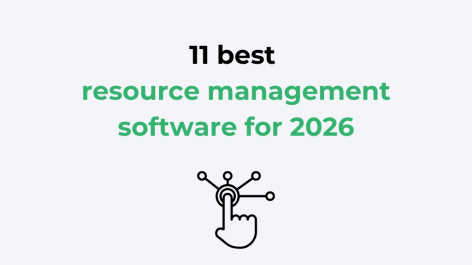Traditional approaches to resource management can't keep pace with how work gets done in 2025. Teams form and reform around projects, skills matter more than job titles, and employees expect more control over their work choices.
The solution? It isn't just having the right tools (though they help). It's rethinking how we allocate human resources to deliver results.
Let’s get into it.
1. Skills intelligence
Gone are the days when resource planning meant simply matching job titles to projects. Forward-thinking businesses are taking a fresh look at their talent pools. Skills intelligence is about understanding what your people can do, not just what their CV says they've done.
For instance, you might discover that 40% of your audit team had untapped data analysis skills that aren't being used in their current roles. By mapping these hidden capabilities, you can unlock new project opportunities and boost employee satisfaction.
But the focus isn’t just knowing who can do what. Modern skills intelligence helps you spot gaps before they hurt delivery. By tracking skill trends and project demands, you can see potential shortfalls months in advance. That means more time to train internal talent or bring in external support.
You can also build better project teams. AI-powered matching looks beyond technical skills and considers past project success, collaboration patterns and learning potential to suggest optimal team compositions.

Plus, you can plan smarter learning investments. When you understand which skills drive the most value, you can focus development budgets where they'll have the biggest impact.
The key is having the right data and knowing how to use it. Leading organisations are using AI to identify adjacent and transferable skills, tracking skill usage and development in real time, and creating skill profiles that evolve with their people.
2. The rise of fluid teams
One change we’re seeing is how rigid team structures are being replaced by skills-based groupings. In fact, this is something Deloitte has been talking about for a couple of years now. And here's a practical example. 👇
One company pioneering this move is Unilever: “We’re beginning to think about each role at Unilever as a collection of skills, rather than simply a job title,” explains Anish Singh, head of HR for Unilever in Australia and New Zealand.
Think about your last major project. Chances are it needed a mix of skills that didn't neatly fit into your org chart. That's where fluid teams come in.

What makes fluid teams different? They form around outcomes, not functions. Instead of starting with "who's in department X?", smart businesses ask "what skills do we need to solve this problem?". It's a subtle shift that delivers big results.
Unilever's seeing this first-hand. Their internal talent marketplace lets them build project teams that cut across traditional boundaries. The outcome? Projects deliver 30% faster and employee engagement is up significantly.
Of course, fluid teams bring fresh challenges. Resource visibility becomes crucial. You need real-time insights into who's working on what, and what's coming up next. Being frank, manual tracking won't cut it anymore.
Skills gaps show up faster. When teams reshape regularly, you quickly spot where your capability shortfalls are. That's actually good news – it means you can fix them sooner.
Plus, management needs to evolve. Leading fluid teams requires different skills than managing fixed departments. Think less about control, more about coordination.
To make this work in practice, leading companies are using AI to suggest team compositions based on past project success, building skills databases that update automatically as people work, and measuring success through outcomes, not just utilisation.
3. Putting people in the driver's seat
Remember when your career path was set by someone else? That's changing fast. Today's top talent expects more say in their work choices—and smart organisations are listening. When employees have more control over their assignments, they bring more energy, creativity and commitment to the work.

[Deloitte insights 2022]
Deloitte’s research shows that companies offering meaningful work choice see:
- Staff retention up by 40%
- Project success rates improved by 35%
- Higher utilisation rates—because people actively seek out work that interests them
But real choice means more than letting people raise their hand for projects. Leading organisations are balancing business needs. Sometimes the work people want isn't what the business needs right now. Smart resource matching tools help find the sweet spot between preference and priority.
To sum up, Deloitte's approach shows how this works in practice. Their internal marketplace lets people spend up to 30% of their time on projects outside their core role. It's boosted both skills development and cross-team collaboration.
4. The tech that makes it happen
Let's be honest—resource management technology hasn't always lived up to the hype. But that's changing fast. Today's tools do more than track time and availability. They're getting smarter about predictive analytics.
For instance, they spot resourcing issues before they impact delivery. Modern systems flag potential overloads and skill gaps weeks in advance, giving you time to adjust.

AI matches people to projects and it learns from every assignment. The more you use it, the better it gets at building high-performing teams. (You can read more about AI in resource management here.)
Plus, your resource management system talks directly to your project tools, HR systems and finance platforms. No more double-entry or conflicting data.
5. Resource management software features for 2025
In 2025, the must-have features look very different from even a few years ago. Understanding what's now possible—and what's becoming essential—can help you make smarter technology choices.
Skills inference engines are advancing how we understand our workforce capabilities. Rather than relying on manual updates or self-reported skills, AI now spots patterns in how people work, what they deliver and how they collaborate. This deeper insight helps you uncover hidden talents and capabilities you didn't know existed in your organisation.
What’s more, capacity planning has moved well beyond simple availability tracking. Modern systems adapt automatically to changing business priorities, helping you balance immediate project needs against longer-term strategic goals. They'll flag potential issues weeks in advance, giving you time to adjust before problems impact delivery.
Team analytics are evolving too. It's no longer enough to know who's free—you need to understand who works well together. Leading platforms now analyse past project success, collaboration patterns and team dynamics to suggest optimal combinations. They'll even flag potential personality clashes or skill gaps that could affect project delivery.
ROI tracking has become easier to see too, by directly linking resource decisions to business outcomes. You can now see how different team compositions affect project success, and how resource utilisation connects to client satisfaction and profitability. This helps you make better decisions about where to invest in skills development.
6. Your 2025 resource management action plan
All this sounds great in theory. But how do you actually get there? Here's your practical roadmap for smarter resource management in 2025.
First things first. Don't try to upgrade everything at once. Start by picking your biggest pain point:
❌Resource bottlenecks? Start with skills mapping and predictive analytics. Understanding what you've got helps you use it better.
📈High staff turnover? Focus on giving people more choice in their work. Employee-driven marketplaces can transform engagement levels.
📮Delivery issues? Look at team composition and skills matching. Better project teams mean better results.
Here are some quick wins to get started with:
- Set up basic skills tracking across your key teams
- Create transparent project marketplaces where people can see opportunities
- Use automation to handle routine resource allocation
- Build simple dashboards that show capacity versus demand
Getting it right isn't always straightforward. Many organisations get stuck trying to perfect their approach before they start. The key is to begin with manageable changes and grow from there. Your team leaders play a crucial role too. By involving them early, you'll create champions who can drive adoption across the business. Measurement matters as well, but focus on metrics that actually drive decisions.
Finally, keep your systems and processes simple. We've seen too many great initiatives fail because they were just too complicated for people to use in their daily work.
Resource management in 2025 and beyond
To sum up, resource management is no longer focused on who's available. Organisations can now build a more agile, skilled and engaged workforce.
The organisations getting this right are seeing real results. They're delivering projects faster, keeping their best people longer and adapting more quickly to change. They're also building stronger cultures where people feel valued for their skills and potential, not just their job title.
Start by understanding your current capabilities. Look at where better resource management could make the biggest difference to your business. Then take small, measured steps towards that goal.
The future of resource management is about making work better for everyone – your business, your clients and your people. The tools and approaches are ready. The question is: are you?
Want to learn more about improving your resource management? Book a demo with our team to see these best practices in action.


